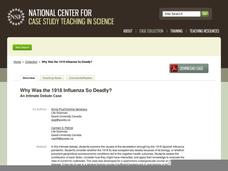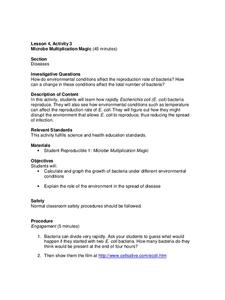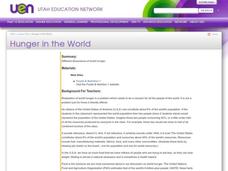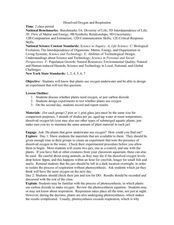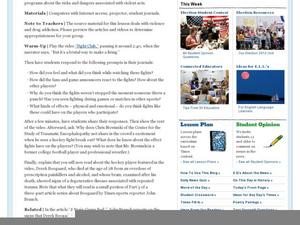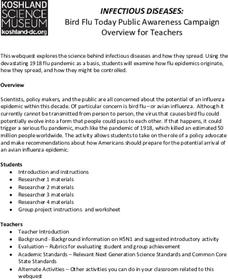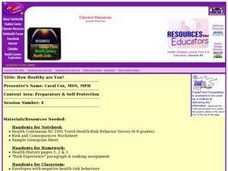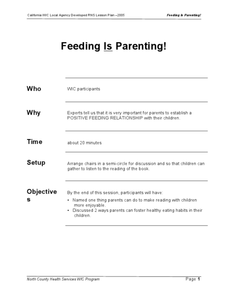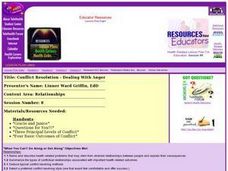Curated OER
Kodomo No Hi: Children's Day Celebration
Children's Day is a beloved Japanese holiday with many colorful and engaging traditions. On this national holiday celebrated yearly on May 5, children are honored for their strengths and given good wishes for happiness. Your younger...
National Center for Case Study Teaching in Science
Why Was the 1918 Influenza So Deadly?
Which factor was more influential in the 1918 flu epidemic: biology, or social and political conditions? Your AP biology class will research and debate one of these positions in an interesting and challenging lesson plan. Intended for...
American Museum of Natural History
Gusty: The Gut Microbiome Card Game
Build up your gut. Groups up to four play a card game to learn more about the microbiome in the gut. Learners try to build a healthy gut with their cards. The player acquiring six microbes without any pathogens wins the game.
Curated OER
Changing Planet: Fading Corals
Show the six-minute video, "Changing Planet: Fading Corals," and then demonstrate how calcium carbonate forms a precipitate in the presence of carbon dioxide. Separate your scientists into small groups to gather information about coral...
Curated OER
From Mercantilism to Adam Smith: The Evolution of the Modern Capitalist System
Useful for history or economics classes, this presentation details the characteristics of mercantilism and its evolution into modern-day capitalism. The slides detail Adam's Smith criticism of mercantilism and how, rather than an...
Curated OER
Home Living / Daily Living: Nail Care
Nails can get really dirty really fast. Prepare your special education class for life on their own by introducing them to a regular nail care routine. They discuss why it is important to care for your nails and practice washing,...
Baylor College
Do Plants Need Light?
Turn your classroom into a greenhouse with a lesson on plant growth. First, investigate the different parts of seeds, identifying the seed coat, cotyledon, and embryo. Then plant the seeds and watch them grow! Measure the new plants...
Centers for Disease Control and Prevention
Microbe Multiplication Magic
A lesson introduces the reproduction rate of E. coli though a video. Then scholars complete a data table and graph of reproduction rates in ideal conditions as well as less than ideal conditions.
Curated OER
Hunger in the World
Consider various aspects of world hunger in this writing lesson. After taking a pre-test, middle and high schoolers play a map game, analyze and discuss world statistics, and write a report on an assigned country. The lesson can apply to...
Curated OER
Dissolved Oxygen and Respiration
Students are presented with the question, "Do plants that grow underwater use oxygen?" They create an experiment to test the presence of dissolved oxygen in the water using provided materials. Student experiments include a control jar as...
Curated OER
On 'Punched Out': Looking at Brain Trauma and Other Risks of Violent Sports
The tragic story of Derek Boogard, a hockey star whose sports-related brain injuries eventually lead to his death, is told through a series of videos. There are also articles that can be read. This poignant lesson gets participants to...
Curated OER
Agricultural Careers
Now here is a very well-designed resource describing the types of jobs available to those interested in pursuing an agricultural career. Each job type is defined by the education required, average annual salary, and job expectations....
Teach Engineering
Dress for Success
Dressing for success is not always about looking sharp. Sometimes it is about staying warm and dry. Present your class with an activity that challenges groups of pupils to design a layered material for blizzard conditions. The teams test...
DiscoverE
Heart Valve Replacement
Put your heart into it. Scholars design and build replacements for mitral heart valves. Obviously, they can't test their creations on a real heart, so a box with marbles (to represent blood cells) will suffice.
National Nanotechnology Infrastructure Network
Help or Hype: The Ethics of Bio-Nanotechnology
Ethical concerns are not always black and white. A well-designed lesson presents learners with scenarios for which ethics may come into question. Scholars learn to consider the different sides of a situation and make an unbiased...
National Academy of Sciences
Infectious Diseases: Bird Flu Today
Understanding how viruses spread has never been more important. A well-designed WebQuest lesson has young scientists research viruses, how they spread, and how they are treated. They also consider the trends in common viruses in the world.
Curated OER
How Healthy are You?
Learners determine how healthy they are. They examine health risk behaviors of adolescents and their consequences. They complete a risk factor survey and discuss why they might take risks.
Curated OER
Feeding is Parenting
Students examine their kid's eating habits. In this adult health lesson, students discuss ways to help their kids eat well. They read a book about positive feeding relationship and apply it at home.
Curated OER
Too Much Sun, Not Much Fun
Sixth graders, in groups, research the dangers of too much sun. They are to create and present posters they made showing the information of what happens when one is exposed to too much sun and how to protect your skin from the sun.
Curated OER
Conflict Resolution - Dealing With Anger
Students summarize the types of conflictual relationships associated with important health related outcomes. They deduce typical conflict resolving methods. They select a preferred conflict resolving style. They role-play a situation and...
Curated OER
#4 School Survey
Students, after brainstorming on health data, design a class or school survey on asthma. They collect, tabulate, and summarize the data. The data is placed on an Excel spreadsheet program. Upon completion, many demographic questions are...
Curated OER
The Five Food Groups
Students explore the five food groups as well as the specific foods found in each of these groups.
Curated OER
Describing Symptoms
Students practice describing their symptoms to a health care worker. They follow certain statements and practice answering them as well. They practice dialogues they might find in an emergency room.
Curated OER
The Value of Exercise: I've Got Muscles!
Exercise and building of muscles are the focus of this health worksheet. Students read a passage which describes voluntary vs. involuntary muscles, then complete a word search which has many types of exercise words hidden in it. An...



